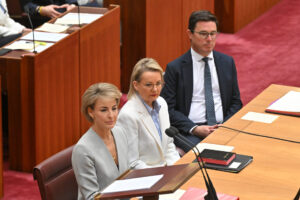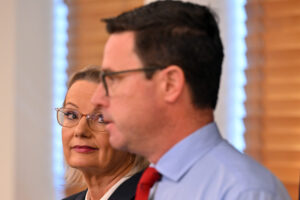Richard’s reflections on the federal budget

But these days, with many Australian shares listed on international stock exchanges and the Australian dollar traded just as effectively in New York or London while the budget speech is being delivered as it is in Sydney the next morning, this tradition simply allows the Government to influence how the budget is reported.
While all the journalists are ‘locked up’ in a room full of other journalists and the odd friendly Treasury official they are locked away from interest groups, experts and opposition political parties while they are writing up their stories.
No doubt that’s what Treasury would call an “unintended consequence”.
While some might argue that it’s not a bad thing that we get to hear, live and uninterrupted, the budget speech once a year, consider what we don’t get.
In the United States, the president gives the State of the Union address in which the big challenges facing the country, and the plan for dealing with those challenges, are spelt out.
However, in Australia we get the “state of the budget”. Rather than a broad look at the big picture issues we take a narrow look at the financial accounts.
We might tell ourselves that money isn’t everything, but from the way governments and oppositions try to distil the worth of our country from the size of the budget deficit you could be forgiven for thinking that money is the priority for those who seek to lead us.
Governments increasingly see the budget as a way to show people what they stand for. Spending lots of money on defence shows the voters that you take the issue of national security seriously, even if the money is poorly targeted and the tanks or submarines are superfluous.
Similarly, taking money off those on welfare, or announcing in the budget that you will make it harder still to receive the pittance we offer those without work or with disabilities is a way to show voters that you value hard work and individual responsibility.
The fact that you have to make the hard lives of some vulnerable people even harder is considered a small price for them to pay for a government convinced it needs to be seen as tough.
The main message out of this week’s budget was that mental health was the big winner with a big new spending package to address this priority area.
While that might have been the main message the Government wanted us to hear, it wasn’t the biggest spending package they included in the budget.
The big winner in the budget was actually the Department of Foreign Affairs and Trade with $1.84 billion in new funding, primarily for aid to Asia and the Middle East, compared with about $598 million in additional funds for mental health over the budget out years.
But in his 30-minute prime-time budget speech, the Treasurer, Wayne Swan, did not mention foreign aid once. For all the talk about priorities, there was, it seems, no time to even mention the area of government spending that received the biggest injection of new funds.
What matters in a budget these days is not where you spend your money, but where you tell people you spend your money. The priorities that matter are those communicated in the minutes spent talking to us during prime time.
But the budget papers are full of real information about the real priorities of the Government. It shows that we spend far more on defence than on education. It shows that we spend far more on subsidising fossil fuel use than we do on tackling climate change. And it shows that we are one of the richest countries in the world, with one of the lowest levels of government debt. We are also now the lowest taxed country in the developed world.
But what the budget doesn’t show, and never will, is why despite all these advantages we have convinced ourselves that we cannot afford to reduce indigenous disadvantage, invest in aged care or invest as much in public transport as we do on roads.
The reason that the budget will never provide the answers to such questions is that they have nothing to do with economics and everything to do with who we are as a society.
Perhaps it’s lucky we don’t have a state of the nation address like the Americans. Stripped of the excuses that economics provides, our leaders might struggle to explain why we care so much about some problems and so little about others.
Dr Richard Denniss is Executive Director of The Australia Institute.
To listen to a podcast of Richard commenting on the budget, click here
Between the Lines Newsletter
The biggest stories and the best analysis from the team at the Australia Institute, delivered to your inbox every fortnight.
You might also like
Looking forward, looking back | Between the Lines
The Wrap with Amy Remeikis In October 1980, before almost half the people voting in this election were born, Ronald Reagan posed what became one of the defining questions of modern politics. Are you better off today than you were four years ago? Reagan would go on to beat Carter and along with Margaret Thatcher,
Ley’s need to appease the far-right drags the Coalition into the political abyss
After months of reflection, recriminations and resolute commitments to change, we finally have the first concrete policy position for a government Sussan Ley would lead.
Gender parity closer after federal election but “sufficiently assertive” Liberal women are still outnumbered two to one
Now that the dust has settled on the 2025 federal election, what does it mean for the representation of women in Australian parliaments? In short, there has been a significant improvement at the national level. When we last wrote on this topic, the Australian Senate was majority female but only 40% of House of Representatives


